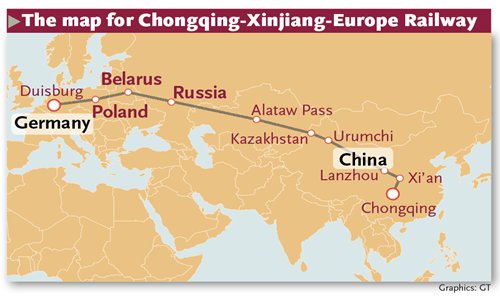China-Europe trains on track

The map for Chongqing-Xinjiang-Europe Railway
Cooperation benefits B&R initiative, facilitates trade
China-Europe freight rail services have become a vital part of the "One Belt, One Road" initiative and helped boost economic cooperation between countries and regions along the route, although concerns over high operating costs persist, experts said Sunday.
The comments came after the railway authorities of China, Belarus, Germany, Kazakhstan, Mongolia, Poland and Russia have signed an agreement to deepen cooperation on China-Europe freight rail services, the Xinhua News Agency reported on Saturday, citing China Railway Corp.
The agreement serves the "One Belt, One Road" initiative, enhances the market share of rail cargo between Asia and Europe and promotes economic growth and trade cooperation for countries and regions along the route, according to the agreement.
The agreement noted that the countries will advance railway infrastructure for safe, smooth, fast, convenient and competitive services and use information technology to increase train speed and unified services.
The countries will expand rail services to more areas with faster customs clearance, and a joint work team and expert team will be formed to solve problems, said Xinhua.
"It is not merely China's responsibility. The joint efforts will help services become institutionalized and secure," He Weiwen, an executive council member at the China Society for the WTO, told the Global Times on Sunday
He noted that "such services aim to promote trade facilitation and market integration, and if they run well, relative upgrading is likely to continue in the future."
Bai Ming, a research fellow at the Chinese Academy of International Trade and Economic Cooperation, told the Global Times on Sunday that freight trains linking China and Europe have become a vital part of the "One Belt, One Road" initiative.
"These countries' efforts to advance such multinational integration and improved management of the services will promote economic and trade connection of countries and regions along the route."
China-Europe freight train service was first launched in 2011 and at least 3,557 freight trains have run so far, the Xinhua report said. The services covered 27 cities across China and 28 cities in 11 countries in Europe, according to the report.
One representative railway, the Chongqing-Xinjiang-Europe Railway, which stretches from Southwest China's Chongqing Municipality to Duisburg, Germany, was put into service in 2011.
It has carried China's goods like IT products, automobiles and motorcycles to Europe, said media reports.
On Sunday, the Russia-Ganzhou freight train, the first service linking East China's Jiangxi Province with Europe, departed from Kansk with 38 containers and successfully arrived at its destination Ganzhou, Jiangxi Province, people.com.cn reported.
The service aims to import from many sources, which will be conducive to efficiently using containers, cutting logistics costs and creating a logistics structure that features balanced exports and imports, according to the report.
The service means that Ganzhou Port officially is involved in the "Belt and Road" initiative and it also marks a new chapter of Sino-Russian economic and trade ties, according to the report .
Experts also expressed concern over the sustainability of these cargo services and warned of potential problems caused by high costs.
"The major problem is that most China-Europe freight trains return to China with their containers empty. Therefore, such services largely depend on local governments' subsidies," said Zhao Jian, a professor at Beijing Jiaotong University.
"The average seaborne shipping fee is 3,000 yuan ($436) per container, while it is about 10,000 yuan by railway," Zhao said, noting that sea shipping is an economical choice for imports of European basic raw materials and exports of China's small commodities.
"Small consumer goods from Yiwu, East China's Zhejiang Province, are better shipped via sea because it does not matter if the shipment is a few days late," Zhao said. Yiwu is the largest wholesale center for small consumer goods in China.
"Only if cargo volumes are large enough, can the costs be reduced," Zhao said.
But experts also said that the expansion of services needs controls.